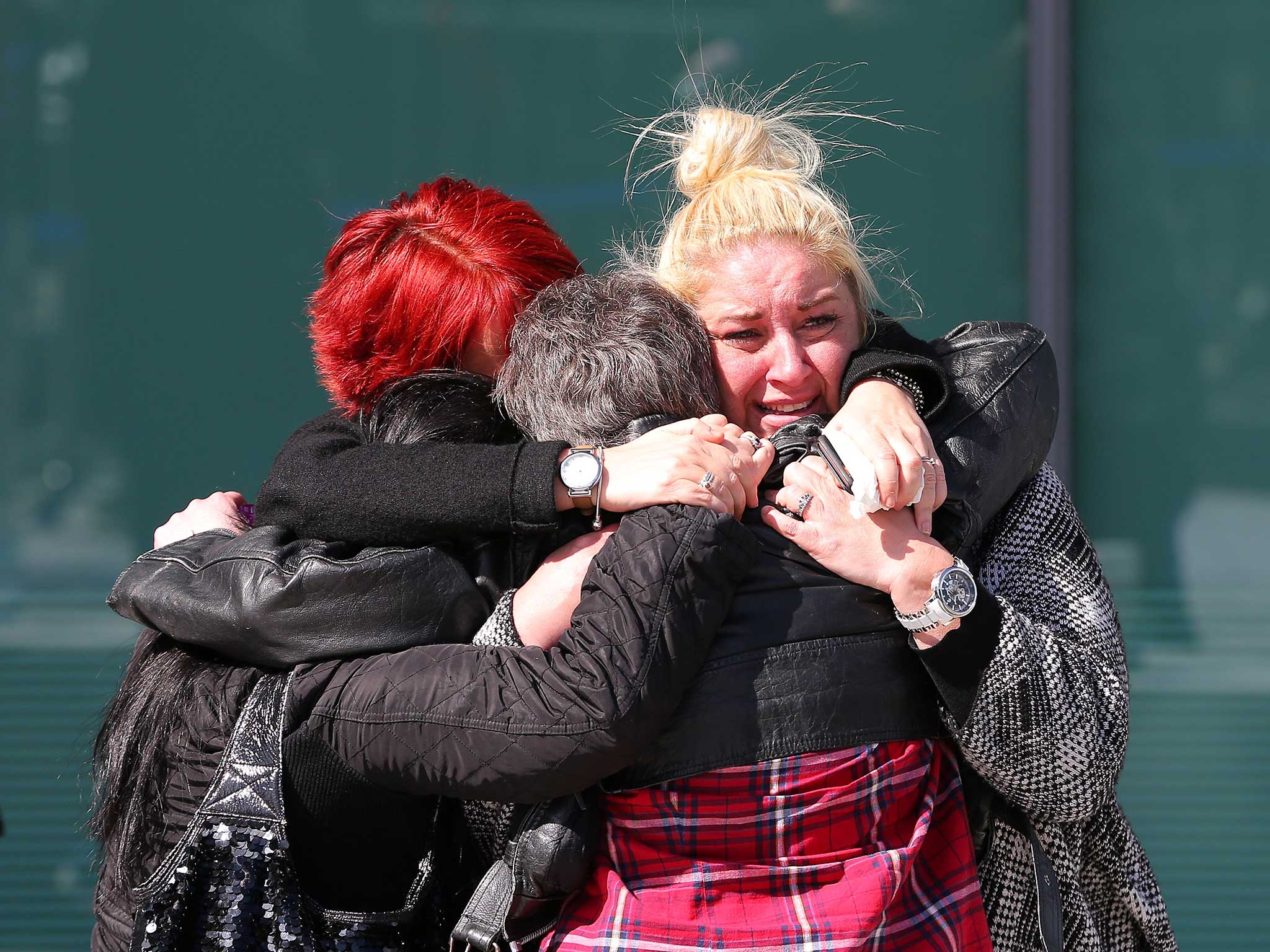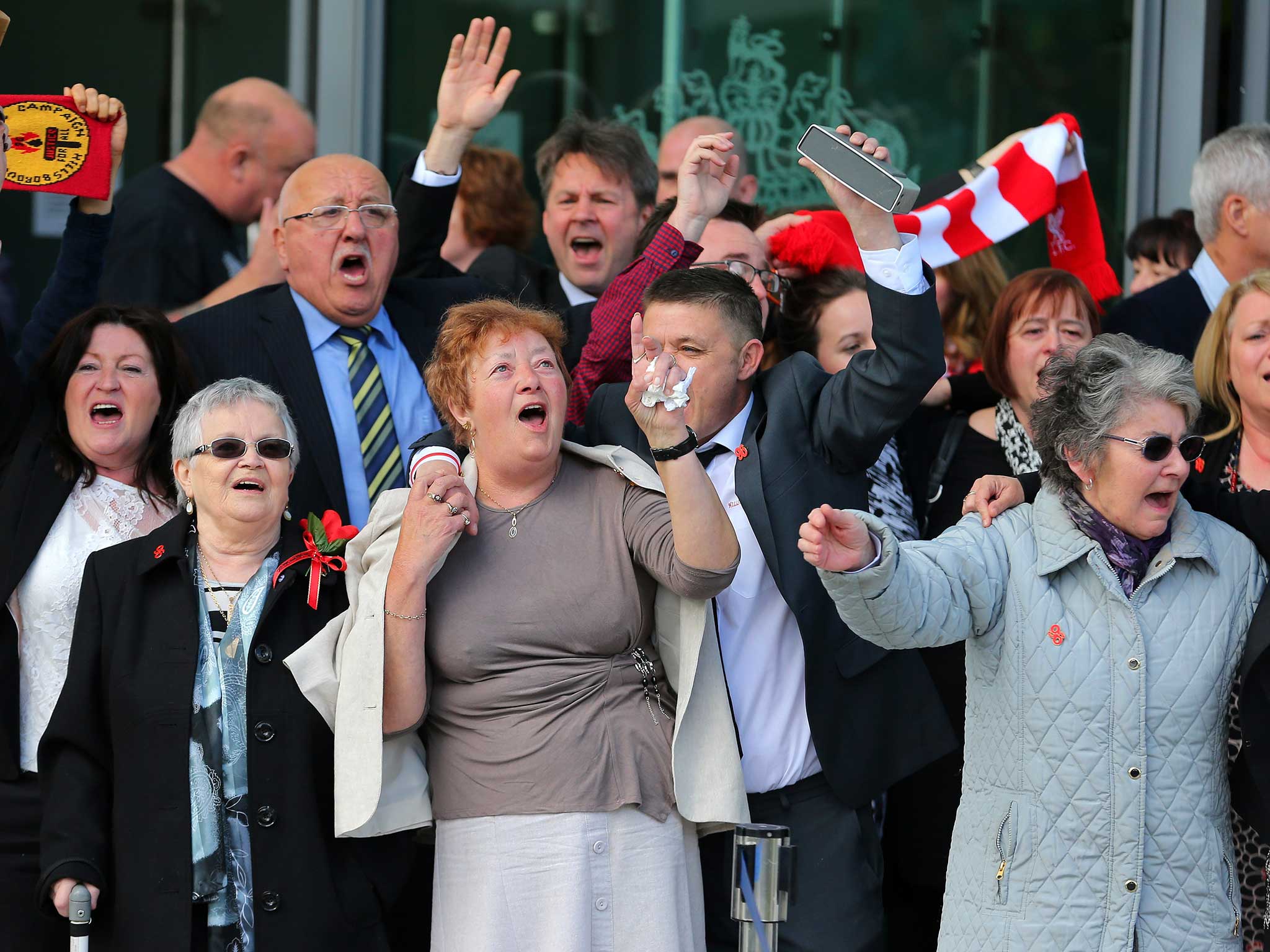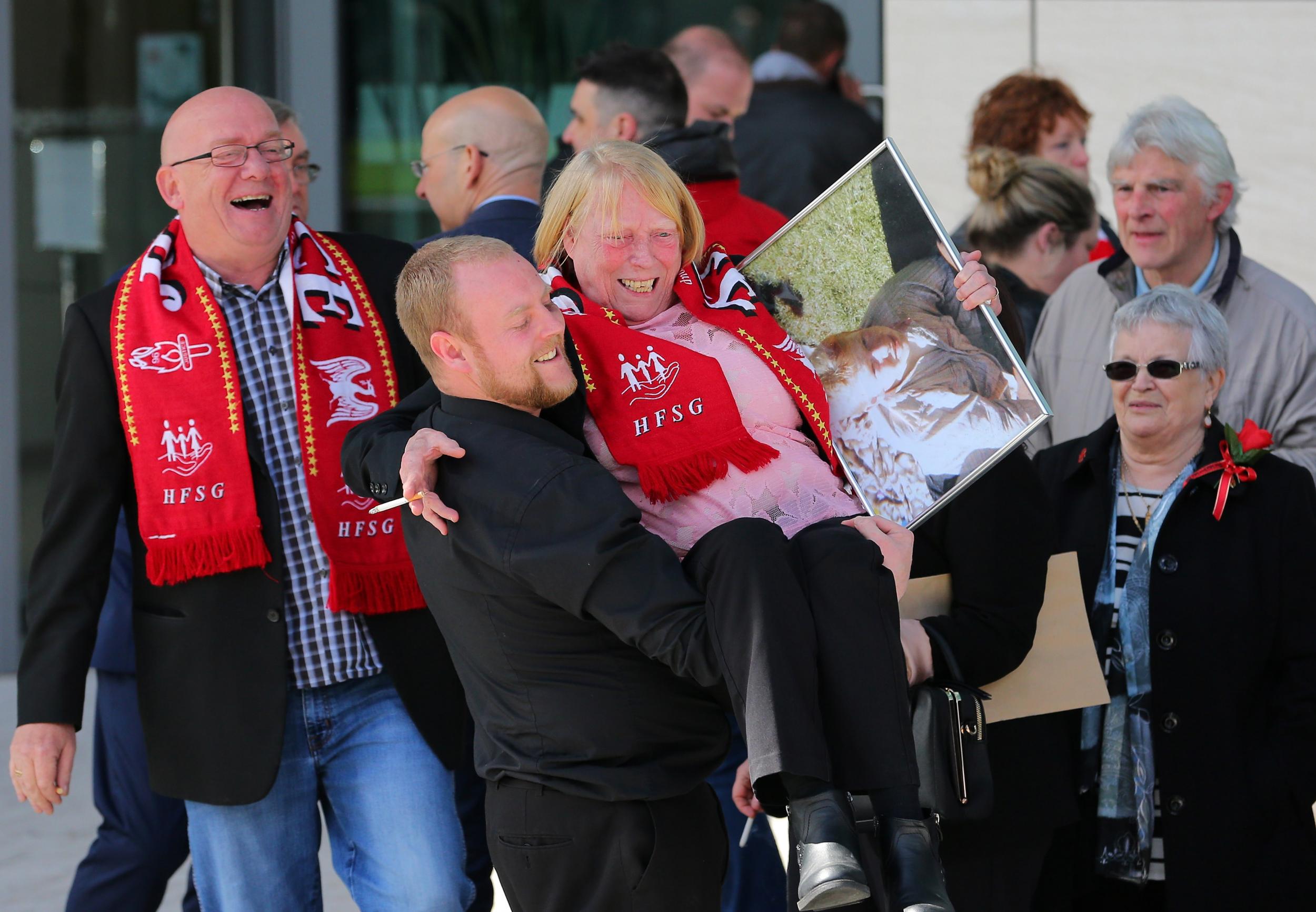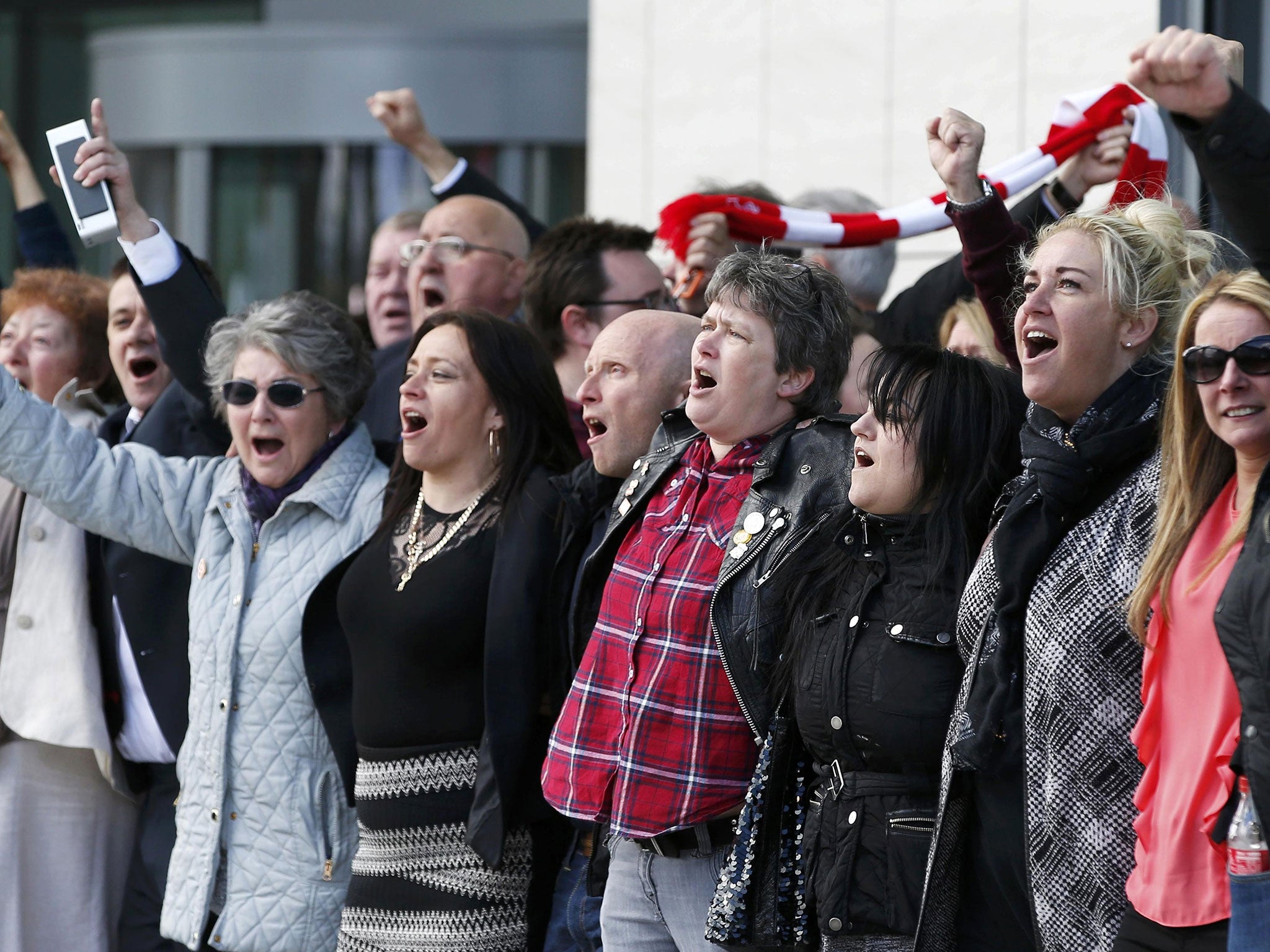Hillsborough disaster verdict: Inquest jury delivers 'unlawful killing' ruling over 1989 football deaths
Verdict prompts sobbing and cries of 'hallelujah' among those at the hearing

Your support helps us to tell the story
From reproductive rights to climate change to Big Tech, The Independent is on the ground when the story is developing. Whether it's investigating the financials of Elon Musk's pro-Trump PAC or producing our latest documentary, 'The A Word', which shines a light on the American women fighting for reproductive rights, we know how important it is to parse out the facts from the messaging.
At such a critical moment in US history, we need reporters on the ground. Your donation allows us to keep sending journalists to speak to both sides of the story.
The Independent is trusted by Americans across the entire political spectrum. And unlike many other quality news outlets, we choose not to lock Americans out of our reporting and analysis with paywalls. We believe quality journalism should be available to everyone, paid for by those who can afford it.
Your support makes all the difference.The 27-year battle for justice by families of those killed at Hillsborough were vindicated today after a jury found the 96 victims of the 1989 disaster were unlawfully killed – a verdict which could see former police chief David Duckenfield stand trial for manslaughter.
The verdict was one of 14 conclusions reached by the jury of nine who, significantly, also concluded that Liverpool supporters had played no part whatsoever in the causes of the disaster.
Follow the latest live updates here
A survivor of the tragedy, who watched his 41-year-old uncle die in the crush while he fought to avoid being drawn down into the suffocating terrace, told The Independent he had been made to feel culpable for his relative’s death for almost three decades.
“I can finally live with what happened now,” said Dave Golding, who was close to tears.
“To have been at the inquests day in and day out, it is obvious that the 96 were unlawfully killed but we could not be certain of the outcome. The events of the years since it has happened has told us always to expect the worst. It isn’t anger we feel. It’s a sense of righting wrongs. It’s relief more than anger after all these years.”
But others felt stronger emotions towards the man who was commanding officer on the day of the tragedy, when Liverpool played Nottingham Forest at Sheffield Wednesday’s football ground in an FA Cup semi-final.
That is because Mr Duckenfield, then South Yorkshire Police's chief superintendent, tried to shift the blame by accusing fans of forcing a gate to cause the crush – something he admitted to during his one week of inquest testimony 13 months ago.
In court, there were cheers of delight at that response and shouts of “thank you” and “hallelujah” as the jury forewoman replied “yes, by a majority” when coroner Sir John Goldring asked her: “Are you satisfied, so that you are sure, that those who died in the Disaster were unlawfully killed?”
The answer to the much-anticipated ‘question six’ does not carry a direct legal consequence because the criminal investigation into the disaster is working independently of the inquests.
But solicitors for the families of the 96 do believe it will make a gross negligence manslaughter charge more likely - and both a team of police detectives and investigators from the Independent Police Complaints Commission (IPCC) said they would submit files to the Crown Prosecution Service (CPS) if there was enough evidence for potential prosecutions.

The cheers were almost as loud for the conclusion that supporters had played no part whatsoever in the disaster.
Families sobbed at that moment. The pressure felt by the jury forewoman was also obvious, with her voice trembling as the general findings on the causes of the disaster were delivered.
When the jury adjourned for the families to collect themselves, ahead of individual verdicts on the 96, the courtoom stood to applaud the nine, who had numbered 11 when initially constituted in 2014.
The jury also unanimously found, in response to the 12 further questions, that the disaster had been caused by catastrophic institutional failings.
They concluded South Yorkshire Police errors caused a dangerous situation at the turnstiles, failures by commanding officers caused a crush on the terraces and that there were mistakes in the police control box over the order to open the Leppings Lane end exit gates.
Sheffield Wednesday FC were also found to be culpable, with the jury deciding defects at the club's stadium contributed to the disaster and that there was an error in the safety certification of the Hillsborough stadium.

It was also found that South Yorkshire Police and South Yorkshire Ambulance Service delayed declaring a major incident - thus delaying the emergency response.
But it was the unlawful killing verdict which was most significant and, if not delivered, risked leaving families feeling justice had not been done.
The burden of proof required to reach such a conclusion about Mr Duckenfield – who under the rules governing inquests cannot be named within the compass of a verdict - is high.

An unlawful killing verdict means the jury concluded that Mr Duckenfield acted or omitted to act in such a way that amounted to manslaughter by gross negligence.
Mr Duckenfield gave the order at 2.52pm on 15 April 1989 to open exit Gate C in Leppings Lane, allowing around 2,000 fans to flood into the already packed central pens behind the goal.
Seven of the nine jury members were satisfied that he knew there was a risk of death when he fatefully opened one of the exit gates to the ground, after which the crush occurred, and yet still failed to recognise what a reasonably competent match commander would have foreseen.
A statement on behalf of the families said the jury's conclusions "completely vindicate" the long fight for justice. It added it has brought "significant progress on the journey... and sense of closure to the bereaved."
Join our commenting forum
Join thought-provoking conversations, follow other Independent readers and see their replies
Comments